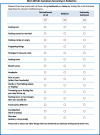Development of mini-SSPedi for children 4-7 years of age receiving cancer treatments
- PMID: 30621617
- PMCID: PMC6325666
- DOI: 10.1186/s12885-018-5210-z
Development of mini-SSPedi for children 4-7 years of age receiving cancer treatments
Abstract
Background: The Symptom Screening in Pediatrics Tool (SSPedi) is valid for assessing symptoms in children aged 8-18 years receiving cancer treatments. The objective was to develop a new self-report symptom screening tool for children receiving cancer treatments who are 4-7 years of age (mini-SSPedi), based on SSPedi.
Methods: Respondents were children with cancer or pediatric hematopoietic stem cell transplantation (HSCT) recipients who were 4-7 years of age. We included the same 15 symptoms contained in SSPedi. Using cognitive interviewing, we developed mini-SSPedi in three phases and made decisions based upon respondent understanding. First, we developed questionnaire structure regarding recall period, concept of bother and response option format. Second, we determined wording of each symptom. Third, we evaluated the entire mini-SSPedi instrument for understanding and ease of completion.
Results: We enrolled 100 participants in total and included 30, 40 and 30 in each of the three phases. Questionnaire structure was satisfactory with a recall period of "today" and a faces-based 3-point Likert scale. Bother was well-understood. Five symptoms required modification to achieve satisfactory understanding while the remaining 10 SSPedi symptoms did not require modification. Among the last 10 children enrolled, all understood each mini-SSPedi item and none thought mini-SSPedi was hard to complete.
Conclusion: We developed a symptom screening tool for children with cancer and pediatric HSCT recipients between 4 and 7 years of age that is understandable and easy to complete. Future work will evaluate the psychometric properties of mini-SSPedi and develop an electronic version of the instrument.
Keywords: Cancer; Children; Hematopoietic stem cell transplantation; Self-report; Symptom screening.
Conflict of interest statement
Ethics approval and consent to participate
The study received Research Ethics Board approval from the Hospital for Sick Children, and parents provided informed consent and children provided assent to participate.
Consent for publication
The manuscript does not contain any identifiable individual information.
Competing interests
The authors declare that they have no competing interests.
Publisher’s Note
Springer Nature remains neutral with regard to jurisdictional claims in published maps and institutional affiliations.
Figures
Similar articles
-
Validation of the Symptom Screening in Pediatrics Tool in Children Receiving Cancer Treatments.J Natl Cancer Inst. 2018 Jun 1;110(6):661-668. doi: 10.1093/jnci/djx250. J Natl Cancer Inst. 2018. PMID: 29272441 Free PMC article.
-
Validation of the Proxy Version of Symptom Screening in Pediatrics Tool in Children Receiving Cancer Treatments.J Pain Symptom Manage. 2018 Jul;56(1):107-112. doi: 10.1016/j.jpainsymman.2018.03.025. Epub 2018 Apr 6. J Pain Symptom Manage. 2018. PMID: 29630923
-
Finalising the administration of co-SSPedi, a dyad approach to symptom screening for paediatric patients receiving cancer treatments.BMJ Support Palliat Care. 2023 Dec 7;13(e2):e469-e475. doi: 10.1136/bmjspcare-2021-003169. BMJ Support Palliat Care. 2023. PMID: 34556545
-
Translating the Symptom Screening in Paediatrics Tool (SSPedi) into North American Spanish and Among Spanish-speaking children receiving cancer treatments: evaluating understandability and cultural relevance in a multiple-phase descriptive study.BMJ Open. 2020 Nov 12;10(11):e037406. doi: 10.1136/bmjopen-2020-037406. BMJ Open. 2020. PMID: 33184077 Free PMC article.
-
The psychometric properties of cancer multisymptom assessment instruments: a clinical review.Support Care Cancer. 2015 Jul;23(7):2189-202. doi: 10.1007/s00520-015-2732-7. Epub 2015 Apr 19. Support Care Cancer. 2015. PMID: 25894883 Review.
Cited by
-
Management of fatigue in children with cancer: a survey of pediatric hematology-oncology professionals' knowledge, attitudes, and practices in the United States and Canada.Support Care Cancer. 2025 Jul 23;33(8):713. doi: 10.1007/s00520-025-09742-w. Support Care Cancer. 2025. PMID: 40699349
-
Discordance between pediatric self-report and parent proxy-report symptom scores and creation of a dyad symptom screening tool (co-SSPedi).Cancer Med. 2020 Aug;9(15):5526-5534. doi: 10.1002/cam4.3235. Epub 2020 Jun 21. Cancer Med. 2020. PMID: 32567173 Free PMC article.
-
MyPal-Child study protocol: an observational prospective clinical feasibility study of the MyPal ePRO-based early palliative care digital system in paediatric oncology patients.BMJ Open. 2021 Apr 13;11(4):e045226. doi: 10.1136/bmjopen-2020-045226. BMJ Open. 2021. PMID: 33849855 Free PMC article.
-
The Symptom Experience in Pediatric Cancer: Current Conceptualizations and Future Directions.Curr Oncol Rep. 2022 Apr;24(4):443-450. doi: 10.1007/s11912-022-01222-2. Epub 2022 Feb 12. Curr Oncol Rep. 2022. PMID: 35150393 Review.
-
Translating the Symptom Screening in Pediatrics Tool (SSPedi) into French and among French-speaking children receiving cancer treatments, evaluating understandability and cultural relevance in a multiple-phase descriptive study.BMJ Open. 2020 Apr 9;10(4):e035265. doi: 10.1136/bmjopen-2019-035265. BMJ Open. 2020. PMID: 32276956 Free PMC article.
References
-
- Canadian Cancer Society's Steering Committee on Cancer Statistics . Canadian Cancer Statistics. Toronto: Canadian Cancer Society; 2011.
MeSH terms
LinkOut - more resources
Full Text Sources
Medical


